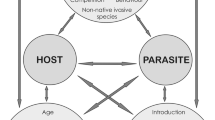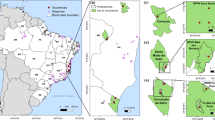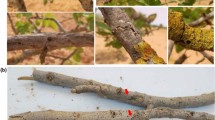Abstract
The harlequin ladybird, Harmonia axyridis, is considered to be one of the most invasive insect species worldwide. Its invasion success and extreme speed of range expansion has been partially attributed to weak control of its populations by natural enemies. Previously published data on emergence rates of the hymenopteran parasitoid Dinocampus coccinellae support the enemy release hypothesis: H. axyridis has been consistently less successfully parasitized compared to native ladybird species. In this study, we show that since 2016, i.e., 10 years after its arrival in Central Europe, several populations of H. axyridis in the Czech Republic have a very high prevalence of D. coccinellae parasitism. D. coccinellae emerged from 46% of H. axyridis individuals in the most parasitized population. Moreover, H. axyridis was more parasitized than the native Coccinella septempunctata in seven of nine investigated co-occurring populations. The meta-analytically pooled estimate of D. coccinellae emergence rate from H. axyridis across the Czech populations (this study) is thirteen times higher than the pooled estimate for invasive populations of this beetle elsewhere (historical data up to 2016). We hypothesize that some Central European populations of D. coccinellae have evolved to overcome the immune system of H. axyridis, which was previously thought to be responsible for the high larval mortality of D. coccinellae. As parasitism rates are highly variable in time and space, we encourage future research investigating the determinants of parasitoid prevalence in H. axyridis and other large ladybird species on a continental scale.

Similar content being viewed by others
References
Balduf WV (1926) The bionomics of Dinocampus coccinellae Schrank. Ann Entomol Soc Am 19:465–498
Berkvens N, Moens J, Berkvens D, Samih MA, Tirry L, De Clercq P (2010) Dinocampus coccinellae as a parasitoid of the invasive ladybird Harmonia axyridis in Europe. Biol Control 53:92–99. https://doi.org/10.1016/j.biocontrol.2009.11.001
Brown PMJ et al (2011) The global spread of Harmonia axyridis (Coleoptera: Coccinellidae): distribution, dispersal and routes of invasion. Biocontrol 56:623–641. https://doi.org/10.1007/s10526-011-9379-1
Castro-Guedes C, Almeida L (2016) Laboratory investigations reveal that Harmonia axyridis (Coleoptera: Coccinellidae) is a poor host for Dinocampus coccinellae (Hymenoptera: Braconidae) in Brazil. J Insect Sci. https://doi.org/10.1093/jisesa/iew044
Ceryngier P, Roy HE, Poland RL (2012) Natural enemies of ladybird beetles. In: Hodek I, van Emden HF, Honěk A (eds) Ecology and behaviour of the ladybird beetles (Coccinellidae). Wiley, Oxford, pp 375–443
Ceryngier P et al (2018) Predators and parasitoids of the harlequin ladybird, Harmonia axyridis, in its native range and invaded areas. Biol Invasions 20:1009–1031. https://doi.org/10.1007/s10530-017-1608-9
Comont RF et al (2014) Escape from parasitism by the invasive alien ladybird, Harmonia axyridis. Insect Conserv Divers 7:334–342. https://doi.org/10.1111/icad.12060
Cox GW (2004) Alien species and evolution: the evolutionary ecology of exotic plants, animals, microbes, and interacting native species. Island Press, Washington
Dheilly NM et al (2015) Who is the puppet master? Replication of a parasitic wasp-associated virus correlates with host behaviour manipulation. Proc R Soc B 282:20142773. https://doi.org/10.1098/rspb.2014.2773
Firlej A, Lucas E, Coderre D, Boivin G (2007) Teratocytes growth pattern reflects host suitability in a host-parasitoid assemblage. Physiol Entomol 32:181–187. https://doi.org/10.1111/j.1365-3032.2006.00548.x
Firlej A, Girard PA, Brehelin M, Coderre D, Boivin G (2012) Immune response of Harmonia axyridis (Coleoptera: Coccinellidae) supports the enemy release hypothesis in North America. Ann Entomol Soc Am 105:328–338. https://doi.org/10.1603/an11026
Fracanti S (2018) Rearing of parasitoid braconid wasp Dinocampus coccinellae in a simplified tritrophic system. Bull Insectol 71:287–293
Haelewaters D, Minnaar IA, Clusella-Trullas S (2016) First finding of the parasitic fungus Hesperomyces virescens (Laboulbeniales) on native and invasive ladybirds (Coleoptera, Coccinellidae) in South Africa. Parasite 23:5. https://doi.org/10.1051/parasite/2016005
Haelewaters D et al (2017) Parasites of Harmonia axyridis: current research and perspectives. Biocontrol 62:355–371. https://doi.org/10.1007/s10526-016-9766-8
Hoogendoorn M, Heimpel GE (2002) Indirect interactions between an introduced and a native ladybird beetle species mediated by a shared parasitoid. Biol Control 25:224–230. https://doi.org/10.1016/s1049-9644(02)00101-9
Koyama S, Majerus MEN (2008) Interactions between the parasitoid wasp Dinocampus coccinellae and two species of coccinellid from Japan and Britain. Biocontrol 53:253–264. https://doi.org/10.1007/s10526-007-9138-5
Majerus MEN (1997) Parasitization of British ladybirds by Dinocampus coccinellae (Schrank) (Hymenoptera: Braconidae). Br J Entomol Nat Hist 10:15–24
Maqbool A, Ahmed I, Kieltyk P, Ceryngier P (2018) Dinocampus coccinellae (Hymenoptera: Braconidae) utilizes both Coccinellini and Chilocorini (Coleoptera: Coccinellidae: Coccinellinae) as hosts in Kashmir Himalayas. Eur J Entomol 115:332–338
Miller JJ (1978) The inverse of the Freeman–Tukey double arcsine transformation. Am Stat 32:138
Obrycki JJ (1989) Parasitization of native and exotic coccinellids by Dinocampus coccinellae (Schrank) (Hymenoptera, Braconidae). J Kansas Entomol Soc 62:211–218
Řeřicha M, Dobeš P, Hyršl P, Knapp M (2018) Ontogeny of protein content, haemocyte concentration and antimicrobial activity against Escherichia coli in invasive harlequin ladybird, Harmonia axyridis (Coleoptera: Coccinellidae). Physiol Entomol 43:51–59. https://doi.org/10.1111/phen.12224
Roy HE, Handley LJL, Schonrogge K, Poland RL, Purse BV (2011) Can the enemy release hypothesis explain the success of invasive alien predators and parasitoids? Biocontrol 56:451–468. https://doi.org/10.1007/s10526-011-9349-7
Roy HE et al (2012) Invasive alien predator causes rapid declines of native European ladybirds. Divers Distrib 18:717–725. https://doi.org/10.1111/j.1472-4642.2012.00883.x
Roy HE et al (2016) The harlequin ladybird, Harmonia axyridis: global perspectives on invasion history and ecology. Biol Invasions 18:997–1044. https://doi.org/10.1007/s10530-016-1077-6
R Development Core Team (2018) A language and environment for statistical computing. http://www.R-project.org. Accessed 5 Dec 2018
Viechtbauer W (2010) Conducting meta-analyses in R with the metafor package. J Stat Softw 36:1–48. https://doi.org/10.18637/jss.v036.i03
Acknowledgements
We are grateful to Helena Antošová, Daniel Bernt, Lukáš Fiedler, Patrycja Siwek and Mona Awad for taking care of our ladybirds in the laboratory, and to Danny Haelewaters and three reviewers for their insightful comments and suggestions on the manuscript. We thank Joel Brown for English edits. This study was supported by the Internal Grant Agency of the Faculty of Environmental Sciences, Czech University of Life Sciences Prague (Grant No. 42110/1312/3145), and by institutional research funding (IUT20-33) of the Estonian Ministry of Education and Research.
Author information
Authors and Affiliations
Corresponding author
Additional information
Publisher's Note
Springer Nature remains neutral with regard to jurisdictional claims in published maps and institutional affiliations.
Rights and permissions
About this article
Cite this article
Knapp, M., Řeřicha, M., Maršíková, S. et al. Invasive host caught up with a native parasitoid: field data reveal high parasitism of Harmonia axyridis by Dinocampus coccinellae in Central Europe. Biol Invasions 21, 2795–2802 (2019). https://doi.org/10.1007/s10530-019-02027-4
Received:
Accepted:
Published:
Issue Date:
DOI: https://doi.org/10.1007/s10530-019-02027-4




